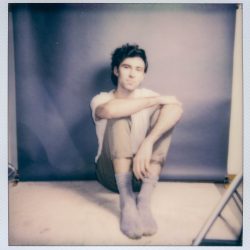Gentle indie-folk telling a vivid and evocative story of a break-up.
 Luke Francis was born and raised in San Francisco but moved to the Pacific Northwest aged 19. He quickly became involved in the indie-folk scene there, eventually joining the americana band Fretland. During the Covid lockdown when the band could not tour, Francis took the opportunity to begin work on this, his first solo album.
Luke Francis was born and raised in San Francisco but moved to the Pacific Northwest aged 19. He quickly became involved in the indie-folk scene there, eventually joining the americana band Fretland. During the Covid lockdown when the band could not tour, Francis took the opportunity to begin work on this, his first solo album.
At this time, Francis’ relationship was breaking down and the album charts the course of the break- it is his “Blood On The Tracks”. However, he tells this story with reference to various locations in the US and this works very well- it makes the story all the more interesting and somehow makes the emotions described more vivid. Musically, it is indie-folk with a pop sensibility at times, not dissimilar to Bon Iver, with Francis’ vocal sounding a bit like his on occasion. Francis’ quiet, plaintive performance fits very well with the heartbreak of the songs. However, “Saguaro” is gentler and more melodic than Bon Iver with beautiful acoustic guitar picking being the background to most songs. Soaring steel guitar and piano are added to various tracks, with violin giving an Irish feel at times.
How does Francis weave location into this poignant story? Well, for example, in the second track ‘Go Home’ he is in Palm Springs, California: “Walking around in the desert by the hotel parking lot/ Everybody else here looks about as old as God”. The tan-coloured light and dark green of the artificial lawns connected to the sadness and disorientation that he was having there. He wants to leave but not to go back to his unhappy home.
The song ‘Tucson’, with its gentle loping beat, was inspired by a visit with his partner to the Joshua Tree desert, west of Los Angeles and again in California. He wants to stay with her, but not if she doesn’t want to stay: “But babe, if it’s me makes you blue/There’s no use throwing roses on it/ Gotta do what you gotta do”. Just before recording the album, he saw the white and yellow Saguaro cactus blossoms near Tucson and named the album after them because he was so struck by their contrast to the arid desert around.
Like “Blood On The Tracks” he appears to revisit the start of the relationship and even ends ‘Michael Collins’ with the line “Here’s lookin’ at you now, Baby Blue”. This is set in snowy Brooklyn and he accepts that he might be looking with rose-tinted glasses at their time there. ‘Halloween’ tells of happier times at a party but ends with “I hear you’re liking Nashville”, where his ex-partner seems to have moved to. In ‘Tennessee Plates’, he comments on her new freedom “You’ve got so much time to be everything/That you wanna be”.
Half-way through the album there is a change of gear with two songs that are more vigorous and could be called pop music. ‘In The Flood’, with orchestral strings, has Francis in a real mess and ‘Nothing But an Ocean’ has “I don’t wanna be lost anymore” as a sombre line but a good hook.
The words on the album are so evocative and skilfully written. If you like Bon Iver-style folk this would be very well worth listening to.


